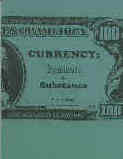
 |
Penultimate Productivity:
Capitalism
STABLE CURRENCY: PENULTIMATE PRODUCTIVITY
Currencies throughout history have had the potential to be the penultimate, that is, next to the best, tool of human productivity. Only one other innovation of human ingenuity offers a greater time-saving capacity than a currency that is kept constant and "current." The ultimate time-saving tool of productivity is democracy. Currency has few rivals as a tool of productivity within a system of human production (an economy).
Human Productivity or Time-savings at Work
One can understand the productive potential of a currency by looking at either historical or contemporary production systems plagued with inflation. Historically, and in some of the contemporary triple-digit inflationary economies, numerous instances existed where much time was wasted because of a lack of currency stability, e.g., Germany 1923 or Argentina 1970s. As the rate of inflation accelerates, people begin to demand that they get paid more often so that they can convert the common intermediate product--currency--into other products that do not lose their buying power as quickly as currency.
Think of the time that is wasted by the employees and the employers as a result of having to have more frequent payments of earnings. In some countries, elsewhere and elsetime, employees have been paid as often as twice a day, at noon and night. What a waste of human time, what a loss of productivity as a result of a currency not being kept stable, constant, or current.
Human Time-Saving Tool of Civilization Away from Work
Currency is a time-saving human tool of productivity, not only at work but away from work. The above example of employees seeking more frequent pay periods is accompanied by the people making more frequent trips to the stores. With a stable, intermediate, common product "kept constant in value", the employee does not have to get paid more frequently, nor does he have to waste a lot of time, energy, and matter making more frequent trips. Instead, he can plan a weekly shopping trip in which his total travel is reduced, the transportation costs are reduced, and other wastes are reduce. Furthermore, a currency "kept constant in value" saves the worker time and improves his standard of living by allowing him to spend more time away from work with his family, with his home, or with his friends. The lack of a stable common intermediate product in a system of production unavoidably causes a decline in the standard of living. The decline in the quality of life reflects the decline in the productive time-saving capacity of the penultimate innovation of human productivity: currency.
Bartering: No Common Intermediate Product
The loss of human time, matter, and energy due to an unstable currency increases with soaring inflation. At a certain point the particular currency will lose all usefulness as the common intermediate product by which producers exchange goods and services. At that time, the particular human system of production has regressed to a barter economy. The economy no longer has the relative, time-saving advantage of a well-maintained currency. The economy can no longer take advantage of how a stable currency is the shortest distance between two producers, between two economical points in time and place.
The amount of wasted time increases as the inflationarily-plagued system produces fewer and fewer products. When a government does not maintain a common intermediate product as a currency, "kept constant in value", then the productive persons must waste time.
Distance of Time, Not Place
A well-maintained currency is the shortest distance between two places or time. The reader will be ahead in understanding the nature of currency, and anticipating the needed currency reform, if different economic points are not viewed as being separated by geographical distance but rather by temporal distance. More important to producers exchanging products is the time between two economic points than the distance. In other words, and when thinking about the deterioration of the value of currency, one should think not of elsewhere but of elsetime.
We need a "common intermediate product"
kept constant and current in work time value.
We need the lifehour.